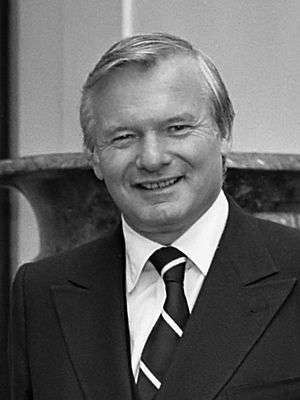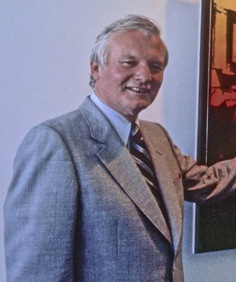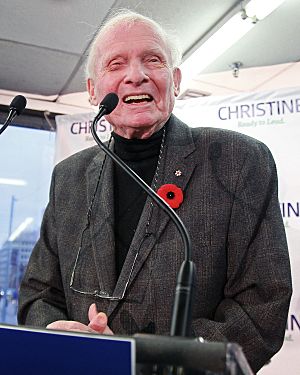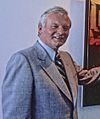Bill Davis facts for kids
Quick facts for kids
Bill Davis
|
|
|---|---|

Davis in 1979
|
|
| 18th Premier of Ontario | |
| In office March 1, 1971 – February 8, 1985 |
|
| Monarch | Elizabeth II |
| Lieutenant Governor | William Ross Macdonald Pauline Mills McGibbon John Black Aird |
| Preceded by | John Robarts |
| Succeeded by | Frank Miller |
| Member of the Ontario Provincial Parliament for Brampton |
|
| In office September 18, 1975 – May 2, 1985 |
|
| Preceded by | District established |
| Succeeded by | Bob Callahan |
| Member of the Ontario Provincial Parliament for Peel North |
|
| In office October 17, 1967 – September 18, 1975 |
|
| Preceded by | District established |
| Succeeded by | District abolished |
| Member of the Ontario Provincial Parliament for Peel |
|
| In office June 11, 1959 – October 17, 1967 |
|
| Preceded by | Thomas Laird Kennedy |
| Succeeded by | District abolished |
| Personal details | |
| Born |
William Grenville Davis
July 30, 1929 Toronto, Ontario, Canada |
| Died | August 8, 2021 (aged 92) Brampton, Ontario, Canada |
| Political party | Progressive Conservative |
| Spouses |
|
| Children | 5 |
| Alma mater | University of Toronto Osgoode Hall Law School |
William Grenville Davis (July 30, 1929 – August 8, 2021) was an important Canadian politician. He was the 18th Premier of Ontario, serving from 1971 to 1985. Davis was first elected as a Member of Provincial Parliament (MPP) for Peel in 1959.
Before becoming Premier, he was the Minister of Education under Premier John Robarts. During this time, he helped create the community college system and the educational TV network now known as TVOntario. As Premier, Davis made many big decisions. These included stopping the building of the Spadina Expressway into downtown Toronto. He also started funding Catholic secondary schools up to grade 12. He helped create Canada's first Ministry of the Environment in Ontario. Davis also played a key role in bringing the Constitution of Canada fully under Canadian control.
Contents
Early Life and Education
William Grenville Davis was born in Toronto, Ontario, on July 30, 1929. His father was a successful lawyer. Davis was interested in politics from a young age, even attending a national political convention at 15. He often helped local politicians with their campaigns.
Davis studied at the University of Toronto, earning a Bachelor of Arts degree in 1951. He was also a football player during his university years. Later, he studied law at Osgoode Hall Law School and became a lawyer in 1955.
Early Political Career
Davis was first elected to the Legislative Assembly of Ontario in the 1959 provincial election. He was only 29 years old when he became the MPP for Peel. He won by a small number of votes. For two years, he supported the government of Premier Leslie Frost. When Frost retired, Davis helped John Robarts become the new Premier.
Minister of Education
On October 25, 1962, Davis was made Minister of Education in Robarts' government. He was re-elected in 1963. In 1964, he also became the Minister of University Affairs. He greatly increased funding for education in the 1960s. Spending went up a lot, and many new public schools opened. Davis also changed the school board system, making it more organized.
As Education Minister, Davis helped create new public universities like Trent University and Brock University. He also started the public community college system. Canada's first educational research institute, the Ontario Institute for Studies in Education, was also created during his time. The educational television network, now called TVOntario, was also started under his leadership.
Because of his work in education, many expected Davis to become the next Premier. He ran for the leadership of his party in 1970. In a close vote, he won and became the new leader. His campaign team became known as the "Big Blue Machine." This group was very good at organizing campaigns for his party.
Cabinet Posts
| Ontario Provincial Government of John Robarts | ||
| Cabinet posts (2) | ||
|---|---|---|
| Predecessor | Office | Successor |
| New position | Minister of University Affairs 1964–1971 |
John White |
| John Robarts | Minister of Education 1962–1971 |
Bob Welch |
Premier
Three months after becoming Premier, Davis announced that his government would stop funding the building of the Spadina Expressway. This highway project was not popular with many people in Toronto. The part of Allen Road that was built was sometimes called the "Davis ditch." In July 1971, he created Ontario's first Minister of the Environment. On August 31, Davis decided not to fully fund Catholic high schools at that time.
The next provincial election was held on October 21, 1971. It was the first time leaders debated on TV for a provincial election. Davis's party gained 9 seats and continued to govern.
Challenges and Changes
Davis's first full term as Premier had some challenges. There were questions about government decisions and contracts. While his government was cleared of any wrongdoing, public support for his party went down. The Conservatives lost some important by-elections.
Davis's government also introduced regional governments for some areas like Durham and Waterloo. In 1975, before the next election, Davis froze energy prices for 90 days. He also temporarily lowered the provincial sales tax and announced rent controls for the province.
Minority Governments
The 1975 election was very competitive. Davis's party won only 51 out of 125 seats. This meant they formed a minority government, where they had fewer than half the seats. They had to work with other parties to pass laws. Davis's party remained in power because the other two main parties, the New Democratic Party (NDP) and the Liberals, could not agree to work together against him.
In 1976, Davis introduced Canada's first law making seat belts mandatory. He called another election in 1977, hoping to win more seats. His party gained 7 seats, reaching 58, but still formed a minority government.
During this time, Davis's government continued to improve public health and education. They also expanded the Human Rights Code and offered more services in both English and French.
Final Term
In the 1981 provincial election, Davis's party won a majority government again. This meant they had more than half the seats and could pass laws more easily. Soon after, Davis announced that Ontario would buy a share in the energy company Suncor.
Davis announced his retirement on October 8, 1984. He was still popular in the polls. One of his last major actions as Premier was to change his earlier decision about Catholic schools. He announced that Catholic schools would receive full public funding up to Grade Thirteen. This policy was supported by all parties, but some of his party's traditional supporters were not happy about it.
Frank Miller became the new leader of Davis's party. In the 1985 provincial election, Davis's party lost many seats and formed a minority government. Soon after, they lost a vote in the legislature and were defeated. This ended their party's 42 years of governing Ontario.
National Scene
Davis had an important role in national politics too. Unlike many other provincial leaders, he strongly supported Prime Minister Pierre Trudeau's plan to bring the Constitution of Canada fully under Canadian control in 1981. Davis's work in these talks was very important in reaching an agreement. This led to the passing of the Constitution Act, 1982, which included the Canadian Charter of Rights and Freedoms.
Legacy
In 2012, a magazine called Policy Options named Bill Davis the second-best Canadian Premier of the last forty years.
Post-Political Career
After leaving politics, Davis was recognized for his service. He was made a Companion of the Order of Canada in 1986 and received the Order of Ontario in 1987. He also served on the boards of many companies.
In 1985 and 1986, Davis worked with the United States to solve the problem of acid rain affecting the Great Lakes. Their report helped lead to the Acid Rain Treaty. Davis was paid only $1 for this important work.
Davis remained a supporter of his party. He also played a role in merging the federal Progressive Conservatives with another party to create the new Conservative Party of Canada in 2003. He campaigned for Conservative Leader Stephen Harper in 2006.
In later years, Davis was again highly respected within the Ontario Progressive Conservative Party. He gave speeches at party events and was praised by new leaders. He also supported different candidates in local elections, including for mayor of his hometown, Brampton. His strong connection to Brampton earned him the nickname "Brampton Billy."
Death
Bill Davis passed away in Brampton on August 8, 2021, at the age of 92.
Recognition
- In 1987, Davis was made an Honorary Senior Fellow of Renison University College.
- He was appointed as a Companion of the Order of Canada in 1986.
- He received the Order of Ontario in 1987.
- In 2001, he was appointed as a Knight in the Legion of Honour of France.
- On October 24, 2006, Davis received Seneca College's first Honorary degree. The college president said it was fitting because Davis helped create the college system in Ontario.
- The Public Policy Forum honored Bill Davis in 2011 for his contributions to public life in Canada.
Eponyms
Many places and buildings are named after Bill Davis:
- William G. Davis Public School – Windsor
- W. G. Davis Senior Public School – Brampton
- William G. Davis Field, Cardinal Leger Secondary School, Brampton
- William G. Davis Senior Public School – Cambridge
- William G. Davis Public School – Scarborough
- Davis Campus, Sheridan College – Brampton
- William G. Davis Building, University of Toronto Mississauga – Mississauga
- William G. Davis Centre for Computer Research, University of Waterloo – Waterloo
- William G. Davis Studio at TVO (where The Agenda with Steve Paikin is filmed)
- William G. Davis Trail – Ontario Place
- A. Grenville and William Davis Courthouse – Brampton
- Premier Davis Boulevard (Seneca College Newnham Campus) – North York
Images for kids
See also
 In Spanish: Bill Davis para niños
In Spanish: Bill Davis para niños
 | Jewel Prestage |
 | Ella Baker |
 | Fannie Lou Hamer |






